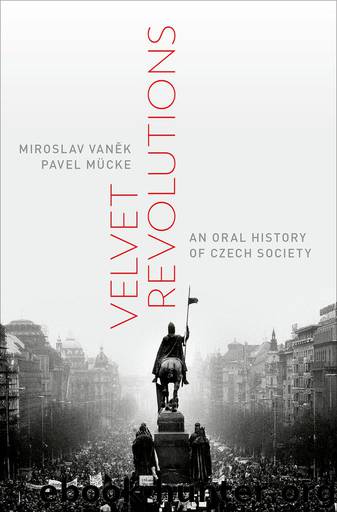Velvet Revolutions by Vanek Miroslav; Mücke Pavel;

Author:Vanek, Miroslav; Mücke, Pavel;
Language: eng
Format: epub
Publisher: Oxford University Press, Incorporated
Published: 2015-03-21T16:00:00+00:00
Many witnesses realized the real benefits of their jobs.
I was happy when a piece of mine came out right. You could see the result right off, and it’s something that’ll be there when I’m gone. (Alena Ekslerová, born 1952, factory worker)
In addition to satisfaction in a well-made product, women workers often stressed the pleasure they felt in being able to match the men. Aside from their dissatisfaction about being unfairly compensated as compared to the men, women cherished the feeling of being appreciated. The respect they got in the workplace could sometimes make up for the lack recognition they got from their families. Even if these were “Communist” honors, the narrators were rightly proud of them.
I enjoyed it. In those days, you might say I really lived for the factory. I enjoyed my work. I can tell you I’m a workaholic to this day. I worked, worked all the time. I liked it better than working in some place like an office or somewhere like that. I’m really like … I love work. I’ve never earned very much money … I was respected, yes, but as for getting any great advantage from it, nothing special. … When it comes to any financial compensation or something like that, no, nothing much. But I did enjoy being respected. (Zdeňka Knytlová, born 1938, cannery worker)
By no means were blue-collar workers the only ones who enjoyed being appreciated; white-collar workers and service employees also stressed the satisfactions of recognition. In particular, professionals such as doctors and medical personnel, soldiers, firefighters, policemen, and others who served the community, the state, or the motherland (it did not matter under what regime), took pride in public recognition of their service, which in their eyes often bordered on a “mission.” Awards such as diplomas, trophies, souvenir items, and obsolete tools evoked nostalgia mixed with notions about what their work should have been but was not.
I still have my uniform, and I don’t know … I’m not going to throw it away because it’s a reminder, part of my memories. There are some medals on it, you know, for my service to the homeland, for the defense of the homeland. But … I have to say you usually got it just for actually having put in some years in the army. So every now and then you got a medal. In some ways it was a sham. That was the way it should have been, but it wasn’t necessarily so. On the other hand, I would say … people somehow lived in peace and at ease, because they knew that there was always some army guarding the border, just in case. So the soldier was always on call, always there protecting the socialist way of life. (Jan Čajník, born 1954, soldier)
Other narrators did not see their work as worthy of particular attention. They saw it merely as a source of money and never stressed their allegiance to the company.
No. I never boast very much about it. Why should I? And I never did.
Download
This site does not store any files on its server. We only index and link to content provided by other sites. Please contact the content providers to delete copyright contents if any and email us, we'll remove relevant links or contents immediately.
| Africa | Americas |
| Arctic & Antarctica | Asia |
| Australia & Oceania | Europe |
| Middle East | Russia |
| United States | World |
| Ancient Civilizations | Military |
| Historical Study & Educational Resources |
Underground: A Human History of the Worlds Beneath Our Feet by Will Hunt(11264)
Navigation and Map Reading by K Andrew(4556)
Sapiens by Yuval Noah Harari(4548)
Barron's AP Biology by Goldberg M.S. Deborah T(3634)
The Sympathizer by Viet Thanh Nguyen(3506)
5 Steps to a 5 AP U.S. History, 2010-2011 Edition (5 Steps to a 5 on the Advanced Placement Examinations Series) by Armstrong Stephen(3406)
Three Women by Lisa Taddeo(2924)
The Comedians: Drunks, Thieves, Scoundrels, and the History of American Comedy by Nesteroff Kliph(2792)
Water by Ian Miller(2595)
Drugs Unlimited by Mike Power(2195)
DarkMarket by Misha Glenny(1849)
The House of Government by Slezkine Yuri(1846)
The Library Book by Susan Orlean(1738)
A Short History of Drunkenness by Forsyth Mark(1731)
Revived (Cat Patrick) by Cat Patrick(1679)
The Woman Who Smashed Codes by Jason Fagone(1650)
The House of Rothschild: Money's Prophets, 1798-1848 by Niall Ferguson(1620)
And the Band Played On by Randy Shilts(1619)
Birth by Tina Cassidy(1572)
